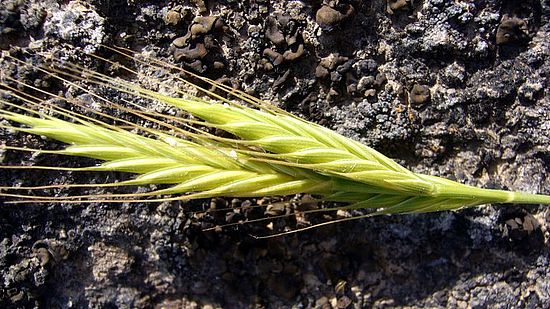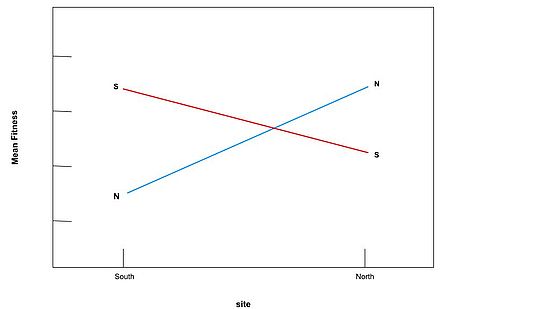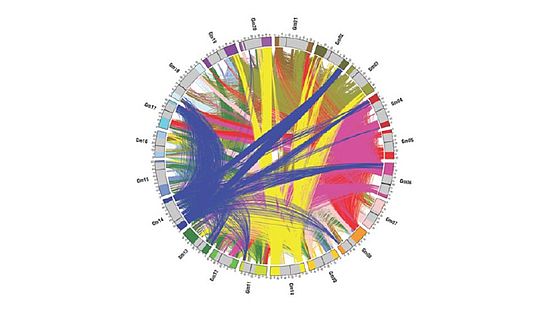Genetic basis of local adaptation
Molecular Ecology
Local adaptation represents the first step to speciation and therefore to biological diversification. Elucidating the genetic mechanisms underlying this process therefore constitutes a key question in the field of evolutionary biology. Mutations as well as chromosome rearrangements have been shown to be involved in this evolutionary process. However, to what extent other sources of genetic variation influence the evolution of natural populations remains poorly understood. To this regard, the aim of our project is to better understand how transposable element activation contributes to the evolution of natural populations, using Brachypodium distachyon as a model.
Research topics
- Genome evolution
- Transposable elements
- Local adaptation
- Genetic diversity
Recent Publications
- Rare transposable elements challenge the prevailing view of transposition dynamics in plants
Stritt, Christoph; Thieme, Michael; Roulin, Anne C.
American Journal Of Botany 10.1002/ajb2.1709 AUG 2021 - Migration without interbreeding: Evolutionary history of a highly selfing Mediterranean grass inferred from whole genomes
Stritt, Christoph; Gimmi, Elena L.; Wyler, Michele; Bakali, Abdelmonaim H.; Skalska, Aleksandra; et al.
Molecular Ecology DOI10.1111/mec.16207 JAN 2022 - Identification of specificity-defining amino acids of the wheat immune receptor Pm2 and powdery mildew effector AvrPm2
Manser, Beatrice; Koller, Teresa; Praz, Coraline Rosalie; Roulin, Anne C.; Zbinden, Helen; Arora, Sanu; Steuernagel, Burkhard; Wulff, Brande B. H.; Keller, Beat; Sanchez-Martin, Javier
Plant Journal 10.1111/tpj.15214 Early Access: APR 2021 - Population genomics and haplotype analysis in spelt and bread wheat identifies a gene regulating glume color
Abrouk, Michael; Athiyannan, Naveenkumar; Mueller, Thomas; Pailles, Yveline; Stritt, Christoph; Roulin, Anne; Chu, Chenggen; Liu, Shuyu; Morita, Takumi; Handa, Hirokazu; Poland, Jesse; Keller, Beat; Krattinger, Simon G.
Communications Biology, 10.1038/s42003-021-01908-6 MAR 19 2021 - Impact of Transposable Elements on Methylation and Gene Expression across Natural Accessions of Brachypodium distachyon
Wyler, Michele; Stritt, Christoph; Walser, Jean-Claude; Baroux, Celia; Roulin, Anne C.
Genome Biology And Evolution, 10.1093/gbe/evaa180 NOV 2020 - Genetic and Methylome Variation in Turkish Brachypodium distachyon Accessions Differentiate Two Geographically Distinct Subpopulations
Skalska, Aleksandra; Stritt, Christoph; Wyler, Michele; Williams, Hefin W.; Vickers, Martin; et al.
International Journal Of Molecular Sciences DOI: 10.3390/ijms21186700 SEP 2020 - Diversity, dynamics and effects of long terminal repeat retrotransposons in the model grass Brachypodium distachyon
Stritt, Christoph; Wyler, Michele; Gimmi, Elena L.; Pippel, Martin; Roulin, Anne C.
New Phytologist, DOI: https://doi.org/10.1111/nph.16308, DEC 2019 - Genome-wide scans of selection highlight the impact of biotic and abiotic constraints in natural populations of the model grass Brachypodium distachyon
Bourgeois, Y; Stritt, C; Walser, JC; Gordon, SP; Vogel, JP; Roulin, AC
PLANT JOURNAL, 96 (2):438-451; 10.1111/tpj.14042 OCT 2018 - Recent Activity in Expanding Populations and Purifying Selection Have Shaped Transposable Element Landscapes across Natural Accessions of the Mediterranean Grass Brachypodium distachyon
Stritt, Christoph; Gordon, Sean P.; Wicker, Thomas; et al.
GENOME BIOLOGY AND EVOLUTION, 10 (1): 304-318 10.1093/gbe/evx276 JAN 2018 - Extensive gene content variation in the Brachypodium distachyon pan-genome correlates with population structure
Gordon, Sean P.; Contreras-Moreira, Bruno; Woods, Daniel P.; et al.
NATURE COMMUNICATIONS, 8: 10.1038/s41467-017-02292-8 DEC 19 2017 - …

Prof. Dr. Anne Roulin
University of Zurich
Department of Plant and Microbial Biology
8008 Zurich
Tel: +41 (0)44 634 83 98
Interdisciplinary
- Population genomics
- Ecology
- Bio-informatics



